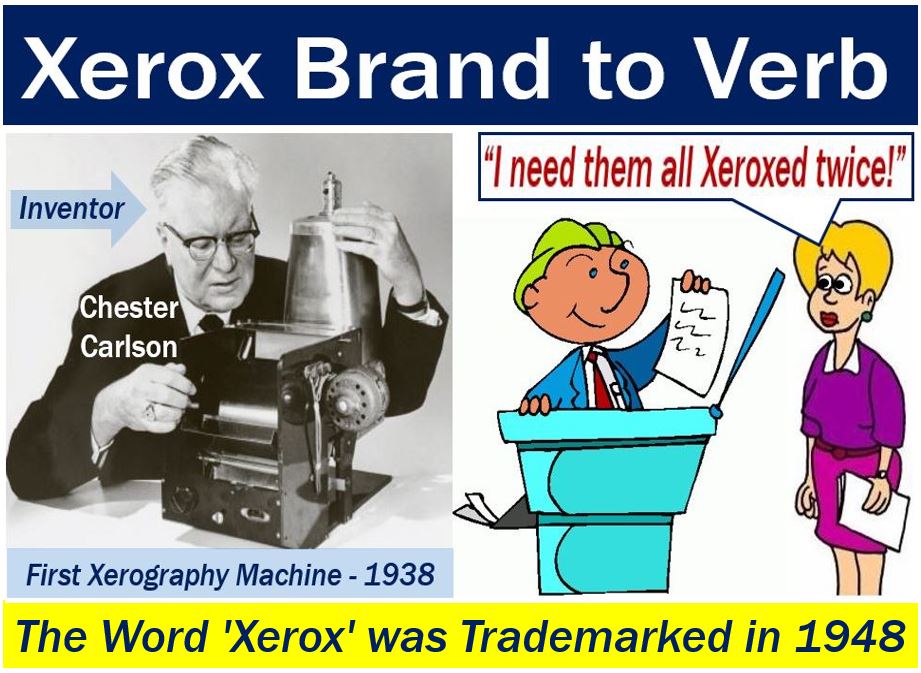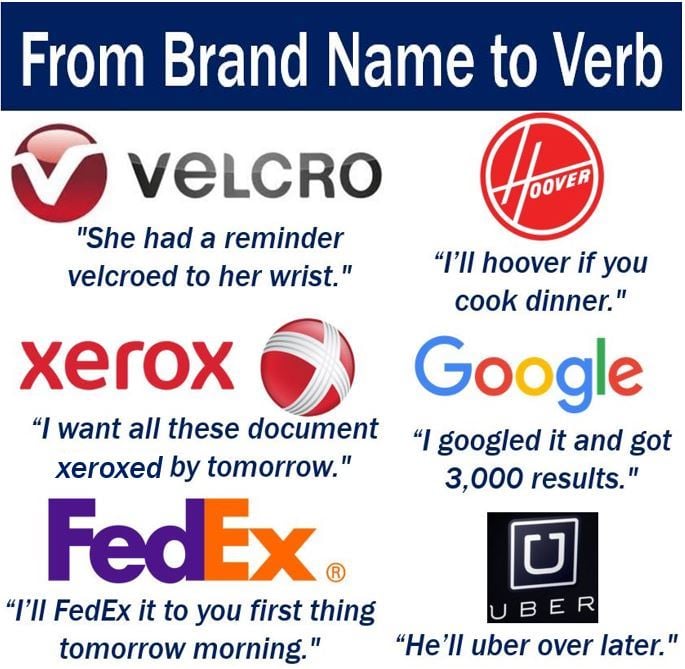Xerox, in North America, India, and many other parts of the world, is commonly used as a verb that means ‘to photocopy’. It is the brand name of an American multinational corporation – the Xerox Corporation – that sells document solutions and services.
Although British English speakers understand ‘Xerox’ when used with the meaning of the verb ‘to photocopy’, they tend to use the verb ‘to photocopy’.
Just as Americans tend to say ‘to vacuum’ or ‘to vacuum clean’, British English speakers more commonly use the name of an established vacuum cleaner maker, and say ‘to hoover’, as in: “It is your turn to hoover the living room tomorrow.”
Should the company be pleased – as well as flattered – that millions of people have adopted its brand name and turned it into a common verb? You would think so, wouldn’t you? Surely, it is the advertiser’s dream – to have people utter its brand name everywhere and everyday, and without having to pay a penny!
 Chester Carlson, born in Seattle in 1906, invented what we know today as the photocopying machine. It was not long after 1948, when the word ‘Xerox’ was trademarked, that Americans began using the brand name as a verb. Today, it is not only a household brand name, it is also a common verb that even appears in prestigious dictionaries. (Image: adapted from 1930sjomc240’s Blog)
Chester Carlson, born in Seattle in 1906, invented what we know today as the photocopying machine. It was not long after 1948, when the word ‘Xerox’ was trademarked, that Americans began using the brand name as a verb. Today, it is not only a household brand name, it is also a common verb that even appears in prestigious dictionaries. (Image: adapted from 1930sjomc240’s Blog)
A company’s brand is the image and personality of the product or service that it portrays in the form of logos, slogans, images, tunes and songs, etc.
Xerox Corporation not happy
The Xerox Corporation is not keen on people using its trademark for everyday language use, i.e. as a synonym for photocopying. The concern for the company is that the ongoing use of ‘xerox’ as a verb might make the courts see it as a generic word.
The Xerox Corporation spends money on advertising in the United States aimed at discouraging Americans from using its brand name as a verb.
It has written to newspapers, magazines and other publications whose writers used the word ‘xerox’ as a verb. It also publishes advertisements that say: “You cannot ‘xerox’ a document, but you can copy it on a Xerox Brand copying machine.”
Verb ‘to xerox’ here to stay
Despite spending lots of time and money trying to steer people in what it considers to be the right direction, most dictionaries, including the Oxford English Dictionary, include the use of the word ‘xerox’ as a verb.
 Companies don’t like their brand names being used as common verbs or nouns in everyday language. If the word becomes part of the English language as a verb or noun, it might become impossible to stop others using it for commercial reasons – they could argue they are simply using everyday words that we can all look up in the dictionary. They worry that they would no longer ‘own’ the word.
Companies don’t like their brand names being used as common verbs or nouns in everyday language. If the word becomes part of the English language as a verb or noun, it might become impossible to stop others using it for commercial reasons – they could argue they are simply using everyday words that we can all look up in the dictionary. They worry that they would no longer ‘own’ the word.
The Oxford English Dictionary has the following definition for xerox (number four is the synonym of ‘to photocopy’):
“1. A xerographic copying process. 2. A copy made using the Xerox process. 3. A machine for copying by xerography. 4. (Verb) Copy a document by the Xerox process: ‘I shall have the typescript xeroxed today.'”
From brand name to verb
There are many brand names that eventually become verbs, such as FedEx, TiVo, Velcro, Superglue, Rollerblade, and Taser. The most recent one is probably ‘Uber’, as in: “I’ll uber over later this evening.”
Marketing and brand experts cannot explain why some famous brands never turn into verbs, while others do.
Why can we say “I will Skype you,” or use FaceTime as a verb, but never use YouTube or Facebook in the same way. We never use Bing or Yahoo as a verb, but do so all the time with the word Google. Twitter has its own verb, as in: “Donald Trump loves tweeting his thoughts at 3 a.m.”
Apple, which according to Forbes is the most valuable brand in the world, has always remained a noun. We have never found a way of saying: “Could you apple it please?” or “I’ll apple you later.”
Regarding the pros and cons of ‘verbifying’ a brand name, in an article published by FastCompany.com in 2012 – Google This: What it Means When a Brand Becomes a Verb‘ – Mike Hoban writes:
” On the one hand, the marketers tend to believe it’s the ultimate compliment and demonstrates a personal connection between consumer and brand.”
“The intellectual property attorneys, on the other hand, usually contend that using a product or brand name this way risks what is termed ‘genericide, (as Dave Barry used to say, ‘I’m not making this up…’) meaning losing the legal power of a trademark.'”
 John Varvatos is an American contemporary menswear designer. He was awarded the 2001 and 2005 CFDA (Council of Fashion Designers of America) Menswear Designer of the Year; in 2000, the Perry Ellis Award for Menswear; and in 2007, the GQ Designer of the Year. (Image: Adapted from Wikipedia)
John Varvatos is an American contemporary menswear designer. He was awarded the 2001 and 2005 CFDA (Council of Fashion Designers of America) Menswear Designer of the Year; in 2000, the Perry Ellis Award for Menswear; and in 2007, the GQ Designer of the Year. (Image: Adapted from Wikipedia)
Video – How Xerox became a household name
This How Sutff Works video talks about Chester Carlson (1906-1968), an American phycisist, patent attorney and inventor, best known for having invented the process of electrophotography, which was later renamed xerography (photocopying).
